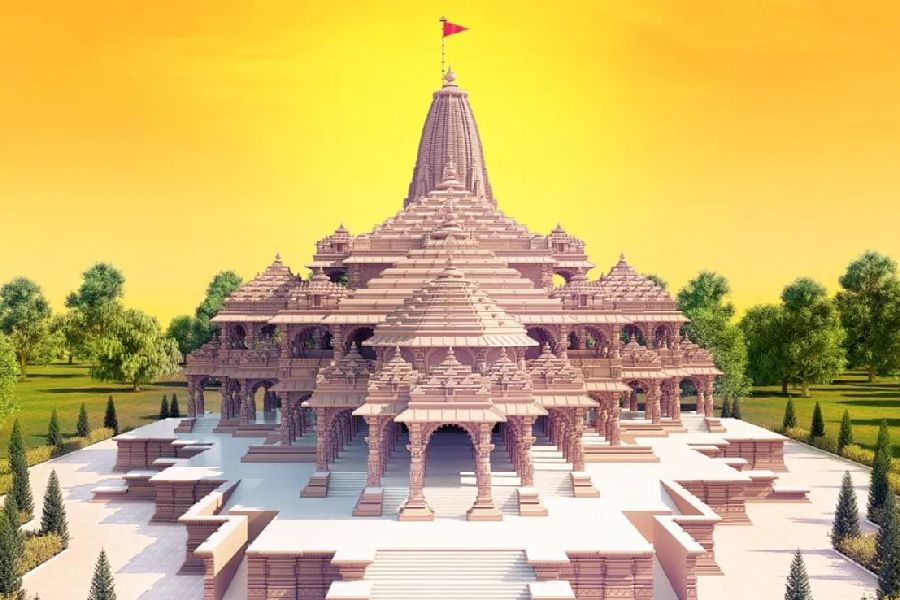India is in the grip of a religio-political frenzy over the consecration of the Ram temple by Prime Minister Narendra Modi in Ayodhya on January 22. Although the event is being held under the aegis of a private trust, central and state governments of the BJP have mobilised their resources to whip up the frenzy ahead of the occasion.
With parliamentary elections around the corner, the saffron ecosystem is on an overdrive to exploit the temple inauguration politically. The Telegraph speaks to a few eminent citizens to know if the involvement of the state machinery in a religious event marks a departure from the secular principle enshrined in the Constitution.
Justice Asok Kumar Ganguly
Former judge of the Supreme Court
In our Constitution, secularism is a central virtue and the Supreme Court has said that it is one of the basic tenets of the Constitution. In other words, it is the soul of the Constitution. In my view, if the country is not secular, it cannot be democratic. In an unequal society, there cannot be any democracy.
Apart from that, the right to preach, practice and propagate one’s religion is also a fundamental right, which is not given to us by the state but is a right that has been earned by the people of India through their incessant fight against religious fundamentalism during the freedom struggle.
The value of secularism has been enshrined in the Constitution and cannot be tinkered with by any state agency. Today, the government is completely aligning with the religious activity of a majoritarian religion disregarding constitutional principles.
The government must respect all religions and in the process cannot associate itself with the temple opening ceremony of a particular religion. Something which completely shocked me is the declaration by the central government of a holiday on the occasion of the opening of a temple. As a person believing in constitutional values and morality, I cannot support this and I raise my humble voice of protest against this.
Sugata Bose
Historian, Gardiner professor of oceanic history and affairs, Harvard University; grandson of Sarat Chandra Bose, grandnephew of Netaji Subhas Chandra Bose
The role of the state in the 22 January spectacle is the most decisive step yet in recasting the Indian republic in a religious majoritarian mould. In the face of such a determined onslaught, a status quoist position based on a post-colonial constitution retaining elements of colonial authoritarianism is unlikely to succeed. It must be met with a principled ideological challenge that is genuinely democratic drawing on our robust history of anti-colonial constitutionalism. Federalism, egalitarianism, and religious harmony are its main pillars.”
Miratun Nahar
Educationist
‘Secular’ and ‘democracy’ are two important words of the Constitution that characterise our nation. This character of India is the reason why the country holds a lofty place in the comity of nations. In a major departure from the nation’s character, the ruling party at the Centre — and I consciously say ruling party because I firmly believe that there is no government in India at this moment — has acted against the secular spirit of the nation and forcefully lowered the country’s head at the feet of religion.
Neither at the Centre nor in the state do we have governments that function on
the principles of democracy and secularism to lead the people to a developed state. I also feel that the state’s ruling party is politically utilising the anti-secular and anti-democratic actions of the central ruling party.
The state ruling party appears to oppose the Centre’s anti-secular actions and claim to stand for amity but in reality, they also endorse the central ruling party’s idea of the relationship between religion and state. The central ruling party has a clear divisive agenda but I feel that the harmony march of the state ruling party will further consolidate the division.
Koushik Sen
Theatre director and actor
I firmly believe religious practice or beliefs are personal and it must be respected by all. But when the government uses its machinery to influence religion for electoral benefit, it becomes alarming and we hear the footsteps of fascism.
Suman Mukhopadhyay
Filmmaker and theatre director
This is completely anti-constitutional and it is an announcement that secularism is now a vague term in India. From this point onwards, India is set to take a disastrous turn. The entire state machinery is working to make this happen... and all the organs of the state... newspapers, radio, television, and social media groups are brandishing this Hindutva... they have taken it to its pinnacle. Just like the demolition of the Babri Masjid, a parallel moment has been created, in a more dangerous way.










